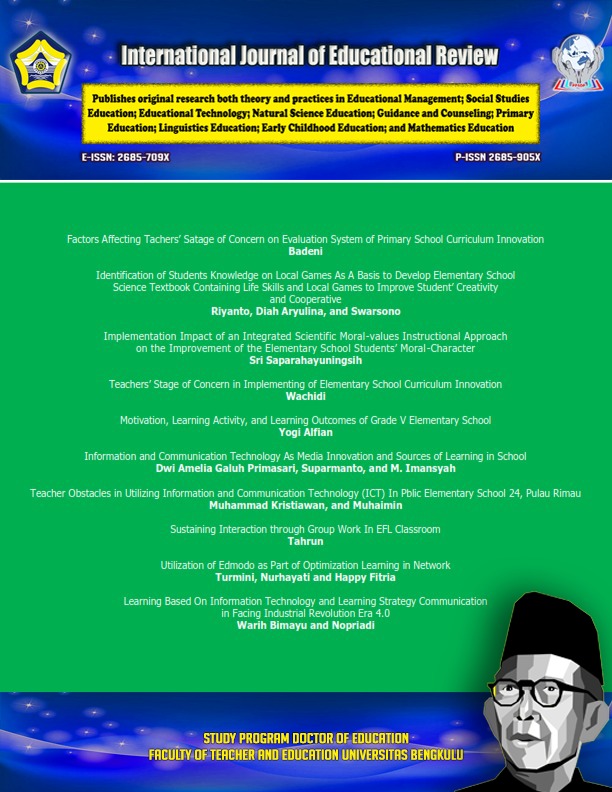English Language Teaching in Post-Genocide Rwanda: A Study of Teachers’ Observance of the Grice’s Cooperative Principle
DOI:
https://doi.org/10.33369/ijer.v2i2.10985Keywords:
English language teaching in Rwanda, Grice’s cooperative principle, Post-genocide Rwanda, educational challenges in RwandaAbstract
The purpose of this paper is to report about how teachers of English in Rwanda implement Grice’s cooperative principle in their classrooms, the challenges they face while implementing it, and how they deal with those challenges. The study upon which this paper is based used survey questionnaires, observations, and interviews as methods of data collection. Grounded theory analysis was employed to make sense of the data. Research findings are articulated according to four maxims including quantitative maxim, qualitative maxim, maxim of relevance, and the maxim of manner. They include the fact that teachers struggle with teaching the prescribed curriculum, communicating with students in English, and teaching what is at their students’ learning level. The paper concludes by devising implications of the findings for policy and practice.
References
Armstrong, T. (2000). Multiple intelligences in the classroom. Cambridge: Cambridge University Press.
Chenitz, W. C., & Swanson, J. M. (1986). Qualitative research using grounded theory. In W. C. Chenitz & J. M. Swanson (Eds.), From practice to grounded theory: Qualitative research in nursing. California: Addison-Wesley.
Clyne, M. (1994). Inter-cultural communication at work: Cultural values in discourse. Cambridge: Cambridge University Press.
Cutting, J. (2008). Pragmatics and discourse: A research book for students. New York: Routledge.
Ehrman, M. (1996). Understanding second language learning difficulties. Thousand Oaks, CA: Sage.
Flowerdew, J. (2013). Discourse in English language education. USA: Routledge.
Green, G. M. (1989). Pragmatics and natural language understanding. New Jersey: Lawrence Erlbaum.
Grice, P. (1975). Speech acts. In P. Cole & J. Morgan (Eds.), Logic and Conversation in syntax and Semantic. New York: Academic Press.
Hamdani, H., Rahmadhani, N., & Kristiawan, M. (2017). The Effect of Raft (Role, Audience, Format And Topic) Strategy Towards Students’ Writing Skill of Recount Text. Britania Journal of English Teaching, 1(1).
Kristiawan, M. (2013). The Implementation of Cooperative Learning in English Class of Favorite School of Secondary High School 5 Batusangkar, West Sumatera. International Journal of Educational Administration and Policy Studies, 5(6), 85-90.
Kristiawan, M., Parlian, R. B., & Johari, I. (2016). The Effect of Time Token Technique towards Students’ Speaking Skill at Science Class of Senior High School 1 Pariaman. Al-Ta lim Journal, 23(1), 22-28.
Maniraho, S. (2013). Attitudes and motivation of teacher training college teachers and students towards English learning and use as medium of instruction in Rwanda. Unpublished MA dissertation. Johannesbag: University of the Witwatersrand.
Moghalu, K. (2005). Rwanda’s Genocide:the politics of Global justice. Palgrave, Macmillan.
O’Donoghue, T. (2007). Planning your qualitative research project. An introduction to interpretive research in education. London, New York: Routledge
Samuelson, B. L. & Freedman, S. W. (2010). Language policy, multilingual education, and power in Rwanda. Language Policy, 9(3), 191-215.
Sari, H. P., Kristiawan, M., & Syaveny, N. (2015). The Effect of Think Pair Share Technique on Students’ Reading Comprehension of Hortatory Exposition Text at Grade XI High School 1 VII Koto Sungai Sarik, Padang Pariaman, West Sumatera. The Journal of Applied Sciences Research, 2(2).
Schoemaker, P. (2011). Brilliant mistakes: Finding success on the far side of failure. Philadelphia: Wharton digital place.
Thomas, J. (1995). The meaning of interaction: An introduction to pragmatics. New York: Longman.
Yuliana, Y., Kristiawan, M., & Suhartie, T. (2014). The Effect of Role Play Toward Experiment Study at Grade XI Padang Pariaman Regency. The Journal of Applied Sciences Research, 1(4).
Zhou, M. (2009). Cooperative principle in oral English teaching. China:Zhejiang Congshang.
Downloads
Published
How to Cite
Issue
Section
License

This work is licensed under a Creative Commons Attribution-ShareAlike 4.0 International License.



